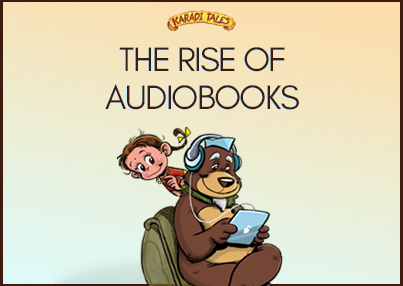Before the invention of television, the medium used for sharing stories used to be the radio. Not just for music, radios offered other recreational purposes too. Radio dramas were widely popular among all the members of the family, including children (See more: The History and Current State of the Radio Drama). Even theatre plays, which were a part of the visual medium, would be turned into radio dramas since these had a wider reach and were easily accessible in every home. Over time, even though the term radio drama is not as commonly used anymore, it has evolved into the form of audiobooks.
The popularity of audiobooks has been steadily increasing over the last decade. With the pandemic affecting the lives of people around the globe, many have turned to audiobooks for entertainment. Unlike reading books, which demands a singular focus, you can listen to audiobooks while doing other tasks such as driving or carrying out household chores.

The Advantages of Audiobooks
Here’s the major advantage of audiobooks – they allow multitasking. One can spend some time away from screens while still being entertained or educated – a quality that’s perfect for kids! Available for all age groups, parents have begun turning towards audiobooks to keep their kids’ minds active while doing routine tasks like cleaning, eating, and so on.
With the rise of social media, the attention span of children has become shorter over the years. You are more likely to find a child glued to a computer game than to a storybook. Audiobooks allow kids to constantly pay attention to stories and other content while keeping their hands busy with activities such as painting or playing with toys. Hence, their auditory senses are always engaged to build their knowledge.
There are many books, nowadays, that are sold along with the audio so that children can read and listen simultaneously. In fact, the combination of reading and listening to a book at the same time has the benefit of allowing the brain to expand its language skills on two fronts rather than just one.
Another important advantage of audiobooks is that children find it easier to listen to and comprehend a story of a higher level as opposed to reading the story. This can help them gain confidence and get exposed to much wider range of stories.
Which is better – Audiobooks or Reading?
While listening to books is highly beneficial, the age-old question does arise – which is better, audiobooks or reading?
Both carry their own set of merits and demerits. For instance, reading would require the child to decode and understand each written word, but when listening, they need to only take in the meaning of what is being said without deciphering each word. This, however, works only in the case of lighter topics. Studies show that reading helps children retain information from complex topics for longer.
Another factor to note is that audiobooks will not wait for children who get distracted. It is not easier to go back and forth on an audio track. When listening, children must comprehend what is being said immediately, which is a complex process. This becomes easier with books where children can find the spot they got distracted at and continue reading without going through a prolonged pause. To learn languages, however, a combination of reading and listening is imperative to grasp the full extent of the new language.
Audiobooks give a more social experience, wherein one can detect sarcasm, a shift in tone and mood etc. These are important cues for children to pick up on that help them during interactions with others. Audiobooks are also easier for groups to follow together. You can join your children and listen to an audiobook, but this would be hard to do if you are all crowded over a book together, each reading at their own pace.
By listening to audiobooks, kids can improve their vocabulary and imagination. Through constant exposure to models of fluent oral reading, they pick up on inflections and correct pronunciation of words.
The End Goal
Whether one is reading or listening to audiobooks, the end goal is to take in the experience and understand the material. Some children find it easier to read and gain knowledge while others prefer an auditory method. It is up to parents and teachers to identify which method the child finds easier to comprehend and to model their teaching methods accordingly.
Audiobooks and stories are an important way for children to learn and make sense of the large world around them. It helps to develop empathy as they connect with characters, and books are a sure-fire way of expanding intelligence. So, whether you want a bonding activity with your child, or you would like your child to grow up to be smart and successful, audiobooks have become the medium to help you get there!





